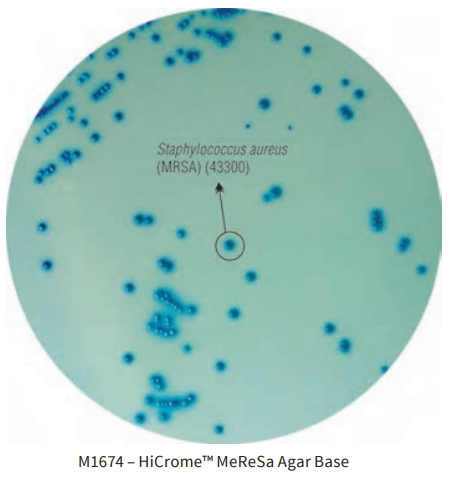HIMEDIA HiCrome 顯色培養基(/產色培養基/呈色培養基) |
顯色培養基(/產色培養基/呈色培養基)
( Chromogenic / Fluorogenic Culture Media )
顯色培養基一般是在培養基中加入檢測特定菌種的特殊性底物。
(一種或多種顯色劑(目測) 或 熒光顯色劑(紫外燈照射觀察) )
該特殊性底物 與 特定微生物自身代謝產生的酶 會產生顯色(產色)情形,
藉此直接觀察菌落顏色即可對菌種做出鑑定,
其反應的靈敏度和特異性大大優於傳統培養基。
顯色培養基通常為乾粉狀,容易儲存。
加蒸餾水溶解後,部分產品無須高壓滅菌,培養時間依具體培養基而定,
通常是18-24小時,比傳統時間顯著縮短。
HiMedia – M1674 HiCrome™ MeReSa Agar Base |
For the isolation and selective identification of Methicillin Resistant Staphylococcus aureus (MRSA) from clinical isolates.
|
Principle and Interpretation
Staphylococcus aureus is an invasive pathogen that can cause disease in almost any tissue or organ in the human body, primarily in compromised individuals (3). Staphylococcal infections were earlier treated using Penicillin. But over the year’s resistance to this drug developed. Methicillin was the next drug of choice. While methicillin is very effective in treating most Staphylococcus infections some strains have developed resistance to methicillin and can no longer be killed by this antibiotic. These resistant bacteria are called Methicillin Resistant Staphylococcus aureus (MRSA) (4). Patients with breaks in their skin due to wounds, indwelling catheters or burns are those with certain risk of developing MRSA infection (2). Spread of MRSA infections can be controlled to a great extent by maintaining personal hygiene after interaction with an MRSA infected person (4). CLSI recommends the usage of cefoxitin instead of oxacillin for determination of resistance against Methicillin for S. aureus (1). To increase the sensitivity for the detection of heterogeneously resistant MRSA strains, cefoxitin is used which selectively inhibits the susceptible strains. Tryptone, HM peptone B and yeast extract provide the essential nutrients along with carbonaceous, nitrogenous and Vitamin B complex nutrients. The proprietary chromogenic mixture incorporated in the medium is specifically cleaved by Staphylococcus aureus to form bluish green coloured colonies. Sodium pyruvate enhances the growth of Staphylococcus species. Sodium chloride in the medium helps to maintain the osmotic equilibrium of the medium. High concentration of sodium chloride also helps in inhibiting the accompanying microflora. The medium is made selective for MRSA by the addition of MeReSa Selective Supplement (FD229) and Cefoxitin Supplement (FD259).
Staphylococcus aureus is an invasive pathogen that can cause disease in almost any tissue or organ in the human body, primarily in compromised individuals (3). Staphylococcal infections were earlier treated using Penicillin. But over the year’s resistance to this drug developed. Methicillin was the next drug of choice. While methicillin is very effective in treating most Staphylococcus infections some strains have developed resistance to methicillin and can no longer be killed by this antibiotic. These resistant bacteria are called Methicillin Resistant Staphylococcus aureus (MRSA) (4). Patients with breaks in their skin due to wounds, indwelling catheters or burns are those with certain risk of developing MRSA infection (2). Spread of MRSA infections can be controlled to a great extent by maintaining personal hygiene after interaction with an MRSA infected person (4). CLSI recommends the usage of cefoxitin instead of oxacillin for determination of resistance against Methicillin for S. aureus (1). To increase the sensitivity for the detection of heterogeneously resistant MRSA strains, cefoxitin is used which selectively inhibits the susceptible strains. Tryptone, HM peptone B and yeast extract provide the essential nutrients along with carbonaceous, nitrogenous and Vitamin B complex nutrients. The proprietary chromogenic mixture incorporated in the medium is specifically cleaved by Staphylococcus aureus to form bluish green coloured colonies. Sodium pyruvate enhances the growth of Staphylococcus species. Sodium chloride in the medium helps to maintain the osmotic equilibrium of the medium. High concentration of sodium chloride also helps in inhibiting the accompanying microflora. The medium is made selective for MRSA by the addition of MeReSa Selective Supplement (FD229) and Cefoxitin Supplement (FD259).
原理與解釋
金黃色葡萄球菌(Staphylococcus aureus)是一種侵入性病原體,幾乎可以在人體的任何組織或器官中引起疾病,主要是受損的個體(3)。早期使用青黴素治療葡萄球菌感染。但過去一年來,這種藥物的耐藥性得到了發展。 甲氧西林是下一個選擇的藥物。雖然甲氧西林在治療大多數葡萄球菌感染方面非常有效,但一些菌株已經對甲氧西林產生抗藥性,並且不再能被這種抗生素殺死。 這些抗性細菌被稱為耐甲氧西林金黃色葡萄球菌(MRSA)(4)。由於傷口,留置導尿管或燒傷而導致皮膚破裂的患者俱有一定的MRSA感染風險(2)。通過在與MRSA感染者相互作用後保持個人衛生,可以在很大程度上控制MRSA感染的傳播(4)。 CLSI建議使用頭孢西丁代替苯唑西林測定金黃色葡萄球菌對甲氧西林的耐藥性(1)。為了增加檢測異質抗性MRSA菌株的靈敏度,使用頭孢西丁選擇性抑制敏感菌株。 胰蛋白腖,HM蛋白腖B和酵母提取物提供必需的營養素以及碳質,含氮和維生素B複合營養素。摻入培養基中的專有顯色混合物被金黃色葡萄球菌特異性切割,形成藍綠色的菌落。丙酮酸鈉促進葡萄球菌的生長。培養基中的氯化鈉有助於維持培養基的滲透平衡。高濃度的氯化鈉也有助於抑制伴隨的微生物群落。 通過添加MeReSa選擇性補充劑(FD229)和頭孢西丁補充劑(FD259)使培養基對MRSA具有選擇性。
金黃色葡萄球菌(Staphylococcus aureus)是一種侵入性病原體,幾乎可以在人體的任何組織或器官中引起疾病,主要是受損的個體(3)。早期使用青黴素治療葡萄球菌感染。但過去一年來,這種藥物的耐藥性得到了發展。 甲氧西林是下一個選擇的藥物。雖然甲氧西林在治療大多數葡萄球菌感染方面非常有效,但一些菌株已經對甲氧西林產生抗藥性,並且不再能被這種抗生素殺死。 這些抗性細菌被稱為耐甲氧西林金黃色葡萄球菌(MRSA)(4)。由於傷口,留置導尿管或燒傷而導致皮膚破裂的患者俱有一定的MRSA感染風險(2)。通過在與MRSA感染者相互作用後保持個人衛生,可以在很大程度上控制MRSA感染的傳播(4)。 CLSI建議使用頭孢西丁代替苯唑西林測定金黃色葡萄球菌對甲氧西林的耐藥性(1)。為了增加檢測異質抗性MRSA菌株的靈敏度,使用頭孢西丁選擇性抑制敏感菌株。 胰蛋白腖,HM蛋白腖B和酵母提取物提供必需的營養素以及碳質,含氮和維生素B複合營養素。摻入培養基中的專有顯色混合物被金黃色葡萄球菌特異性切割,形成藍綠色的菌落。丙酮酸鈉促進葡萄球菌的生長。培養基中的氯化鈉有助於維持培養基的滲透平衡。高濃度的氯化鈉也有助於抑制伴隨的微生物群落。 通過添加MeReSa選擇性補充劑(FD229)和頭孢西丁補充劑(FD259)使培養基對MRSA具有選擇性。
HiMedia Laboratories 的顯色培養基 產品以HiCrome為開頭命名
相較於 法國Chromagar、德國Merck、英國Oxoid、美國Remel 其他顯色培養基品牌,
HiMedia 顯色培養基產品 更多元,更豐富,品質優越。

